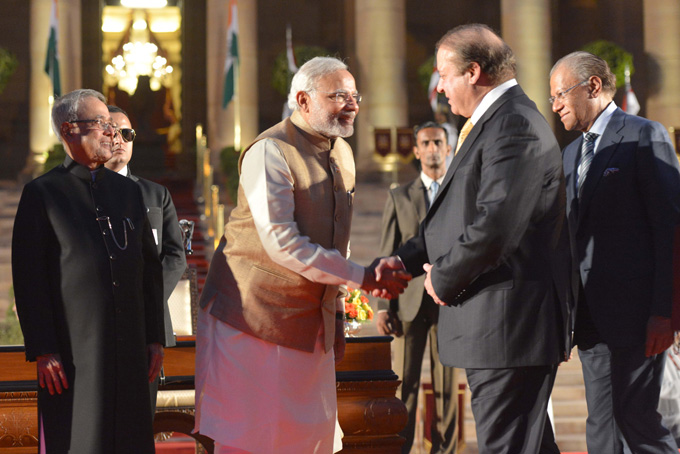
“The arrival of a highly motivated Indian government offers a new chance to improve bilateral relations and avoid another nuclear-tinged crisis on the subcontinent.” ~ Michael Krepon
In his recent article titled “Pakistan’s Choice,” Michael Krepon highlights how the Pakistani military is not on the same page with the civilian government on the issue of Pakistan’s relations with India. The article explains how the country has been failing for a long time and continues downward with an even greater “resiliency.” Krepon identifies various remedies for this downward spiral, all of which rest on Pakistan’s improved relations with India. He also argues the need for the civil and military establishments to begin seeing eye to eye on important issues. Incidentally a recent event highlighted this gap existing between the civil and military.
Prime Minister Nawaz Sharif’s decision to attend BJP leader and Indian Prime Minister Narender Modi’s inauguration ceremony in Delhi was not very well received in Pakistan. Critics were quick to point out how hardliners (read military establishment) in Pakistan were opposed to Nawaz Sharif’s visit and how he heroically “fought” them off to confirm his visit. The opposition can be attributed partly to Modi’s election campaign, which was characterized by severe criticism of the Congress for engaging with Pakistan and openly threatening Pakistan too. His invitation to his Pakistani counterpart therefore came as a big surprise. Both the invitation and the decision to accept were publicized as equally “bold” moves. On the eve of his departure to Delhi PM Sharif even announced the release of 151 prisoners as a gesture of goodwill.
Notwithstanding the merits of Modi’s invitation BJP’s oldest ally, Shiv Sena sharply criticized Modi’s invitation to Sharif. The RSS believes India must not deal with Pakistan unless violence along the border stops. However, Shiv Sena chief Uddhav Thackeray announced his decision to attend despite it being “difficult to trust Pakistan.” Shiv Sena is the second largest constituent of the NDA and was in a “bind about attending the ceremony” due to its strong anti-Pakistan sentiment. The Shiv Sena was even against Indo-Pakistan cricket ties. It however refrained from making this an issue ahead of cabinet formation. According to a senior BJP leader, “The Shiv Sena decided not to offend Mr Modi at this crucial juncture. They would have risked being excluded from the Union Cabinet. It was conveyed to them that the BJP would not have taken kindly to their absence. So they decided to look at the larger picture.” Seemingly Shiv Sena’s decision to “ look at the larger picture” was soon swayed by its even greater anti-Pakistan sentiment:
“Till now only India has tried to forget the past and extend the hand of friendship towards Pakistan. It is difficult to have faith in Pakistan. Since we have faith in Mr Modi’s strong leadership, we don’t want to obstruct this. But if after all this, Pakistan’s tail remains crooked, then Modi will have to press the nuclear button in his hand.”
Such remarks by India’s civilian leadership will only serve to strengthen the sentiments of hardliners in Pakistan- after all nuclear decision making in the country rests with its civilian leadership. Evidently on the issue of its relations with Pakistan, India’s civilian government is not entirely on the same page either. If Pakistan’s civil military relations are a “hard case”, India’s civilian-civilian relations are even harder!
***
Image: Narendra Modi, Flickr